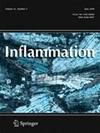NOD3 Reduces Sepsis-Induced Acute Lung Injury by Regulating the Activation of NLRP3 Inflammasome and the Polarization of Alveolar Macrophages
Abstract
The pathogenesis of sepsis-induced Acute lung injury (ALI) progresses rapidly, and no effective treatment drugs are known, resulting in a high mortality rate. NLR family pyrin domain containing 3 (NLRP3) inflammasome activation plays an important role in the pathological progression of ALI, and often coincide with the inflammatory activation and polarization of macrophages. NLR family CARD domain-containing protein 3 (NOD3) was reported protecting against sepsis-induced pulmonary pathological injury and inhibiting the inflammatory response in lung tissue. NOD3 can also inhibit NLRP3 inflammasome activation by competitively inhibiting the binding of pro-caspase-1 to apoptosis-related ASC or reducing NLRP3/cryopyrin-induced ASC speckle formation. In this study, we aimed to explore whether NOD3 decrease sepsis-induced lung injury by interfering with NLRP3 inflammasome activation and regulating alveolar macrophages (AMs) polarization. To investigate whether NOD3 reduce sepsis-induced ALI by inhibiting the activation of NLRP3 inflammasome to regulate the polarization of AMs. Sepsis-induced WT (C57BL/6) and NLRC3-/--C57BL/6 mice ALI models were established by intraperitoneal injection of lipopolysaccharide (LPS). In vitro experiments, AMs and bone marrow-derived macrophages (BMDMs) were isolated from WT and NLRC3-/- mice. Using in vivo and in vitro experiments, we found that NOD3 knockout promoted the sepsis-induced inflammatory response in lung tissue. In addition, NOD3 knockout promoted the activation of the TRAF6-NF-κB signaling pathway and the NLRP3 inflammasome in AMs, enhanced the M1-type polarization of AMs and decreased the M2-type polarization of AMs in sepsis-induced lung injury model mice. NOD3 interfered with NLRP3 inflammasome activation by inhibiting NLRP3 inflammasome assembly or negatively regulating the TRAF6-NF-κB signaling pathway, and regulating the polarization of AMs, thereby alleviating sepsis-induced lung injury.





